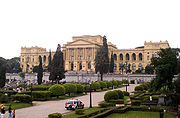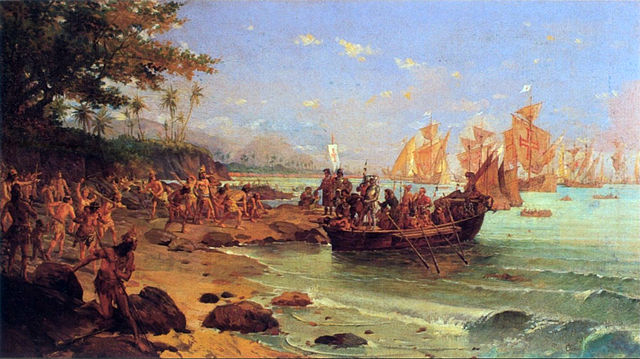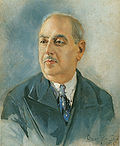 |
This is a file from the Wikimedia Commons. Information from its description page there is shown below.
Commons is a freely licensed media file repository. You can help.
|
| Artist |
|
| Title |
English: Landing of Pedro Álvares Cabral in Porto Seguro, in 1500
Português: Desembarque de Pedro Álvares Cabral em Porto Seguro em 1500
|
| Date |
1902 |
| Medium |
oil on canvas |
| Dimensions |
330 × 1,900 cm (129.9 × 748 in) |
| Current location |
Museu Paulista  |
 |
| Native name |
Museu Paulista |
| Location |
Parque da Independência s/n
Ipiranga São Paulo
CEP 04263-000
Brazil |
| Coordinates |
23° 35′ 8.19″ S, 46° 36′ 34.84″ W   |
| Established |
1895 |
| Website |
www.mp.usp.br |
| Authority control |
|
|
| São Paulo |
| Notes |
This painting was sold to the Brazilian government in 1902 for 8 contos de reis (8 million reis). By 1903, reproductions of the painting were published on postcards and in books. |
| Source/Photographer |
Scanned from Museu Paulista/Safra catalogue. |
Permission
( Reusing this file) |
| Public domainPublic domainfalsefalse |
 |
This work is in the public domain in the United States because it was published (or registered with the U.S. Copyright Office) before January 1, 1923. Public domain works must be out of copyright in both the United States and in the source country of the work in order to be hosted on the Commons. If the work is not a U.S. work, the file must have an additional copyright tag indicating the copyright status in the source country.
|
| Public domainPublic domainfalsefalse |
This image is in the public domain because it is a mere mechanical scan or photocopy of a public domain original, or – from the available evidence – is so similar to such a scan or photocopy that no copyright protection can be expected to arise. The original itself is in public domain for the following reason:
| Public domainPublic domainfalsefalse |
 |
This image (or other media file) is in the public domain because its copyright has expired.
This applies to Australia, the European Union and those countries with a copyright term of life of the author plus 70 years.
 You must also include a United States public domain tag to indicate why this work is in the public domain in the United States. Note that a few countries have copyright terms longer than 70 years: Mexico has 100 years, Colombia has 80 years, and Guatemala and Samoa have 75 years, Russia has 74 years for some authors. This image may not be in the public domain in these countries, which moreover do not implement the rule of the shorter term. Côte d'Ivoire has a general copyright term of 99 years and Honduras has 75 years, but they do implement the rule of the shorter term. You must also include a United States public domain tag to indicate why this work is in the public domain in the United States. Note that a few countries have copyright terms longer than 70 years: Mexico has 100 years, Colombia has 80 years, and Guatemala and Samoa have 75 years, Russia has 74 years for some authors. This image may not be in the public domain in these countries, which moreover do not implement the rule of the shorter term. Côte d'Ivoire has a general copyright term of 99 years and Honduras has 75 years, but they do implement the rule of the shorter term.
|
|
This file has been identified as being free of known restrictions under copyright law, including all related and neighboring rights.
|
This tag is designed for use where there may be a need to assert that any enhancements (eg brightness, contrast, colour-matching, sharpening) are in themselves insufficiently creative to generate a new copyright. It can be used where it is unknown whether any enhancements have been made, as well as when the enhancements are clear but insufficient. For known raw unenhanced scans you can use an appropriate {{PD-old}} tag instead. For usage, see Commons:When to use the PD-scan tag.
Note: This tag applies to scans and photocopies only. For photographs of public domain originals taken from afar, {{PD-Art}} may be applicable. See Commons:When to use the PD-Art tag. |
|
References
- ↑ Tarasantchi, Ruth Sprung (2002) " Oscar Pereira da Silva" in Pintores Paisagistas: São Paulo, 1890 a 1920, São Paulo, Brasil: Editora da Universidade de São Paulo, pp. p. 121 Retrieved on 4 November 2010. ISBN: 85-314-0598-X.
- ↑ Pinto, Adolpho Augusto (1903) Historia da Viação Publica de S. Paulo (Brasil) (PDF), São Paulo, Brasil: Typographia e Papelaria de Vanorden & Cia, pp. Page facing p. 8 Retrieved on 5 November 2010.
File usage
The following pages on Schools Wikipedia link to this image (list may be incomplete):
Schools Wikipedia was created by children's charity SOS Childrens Villages. SOS Childrens Villages is there for the children in our care until they are ready for independence. Have you thought about sponsoring a child?





